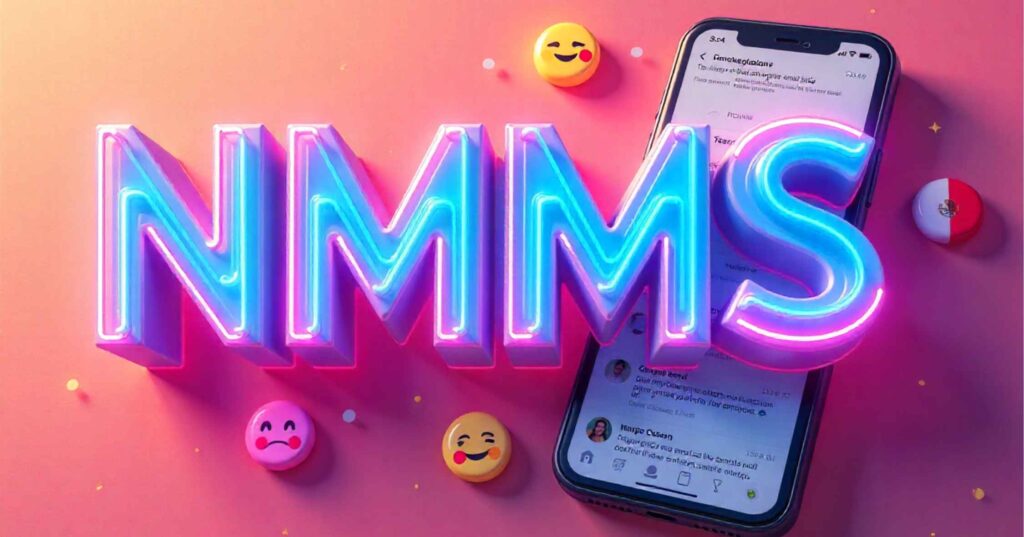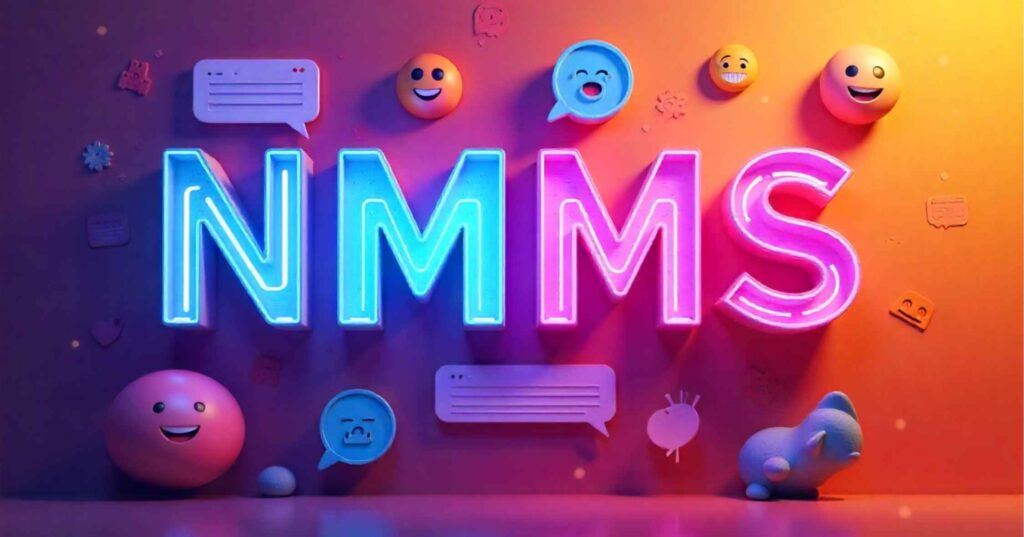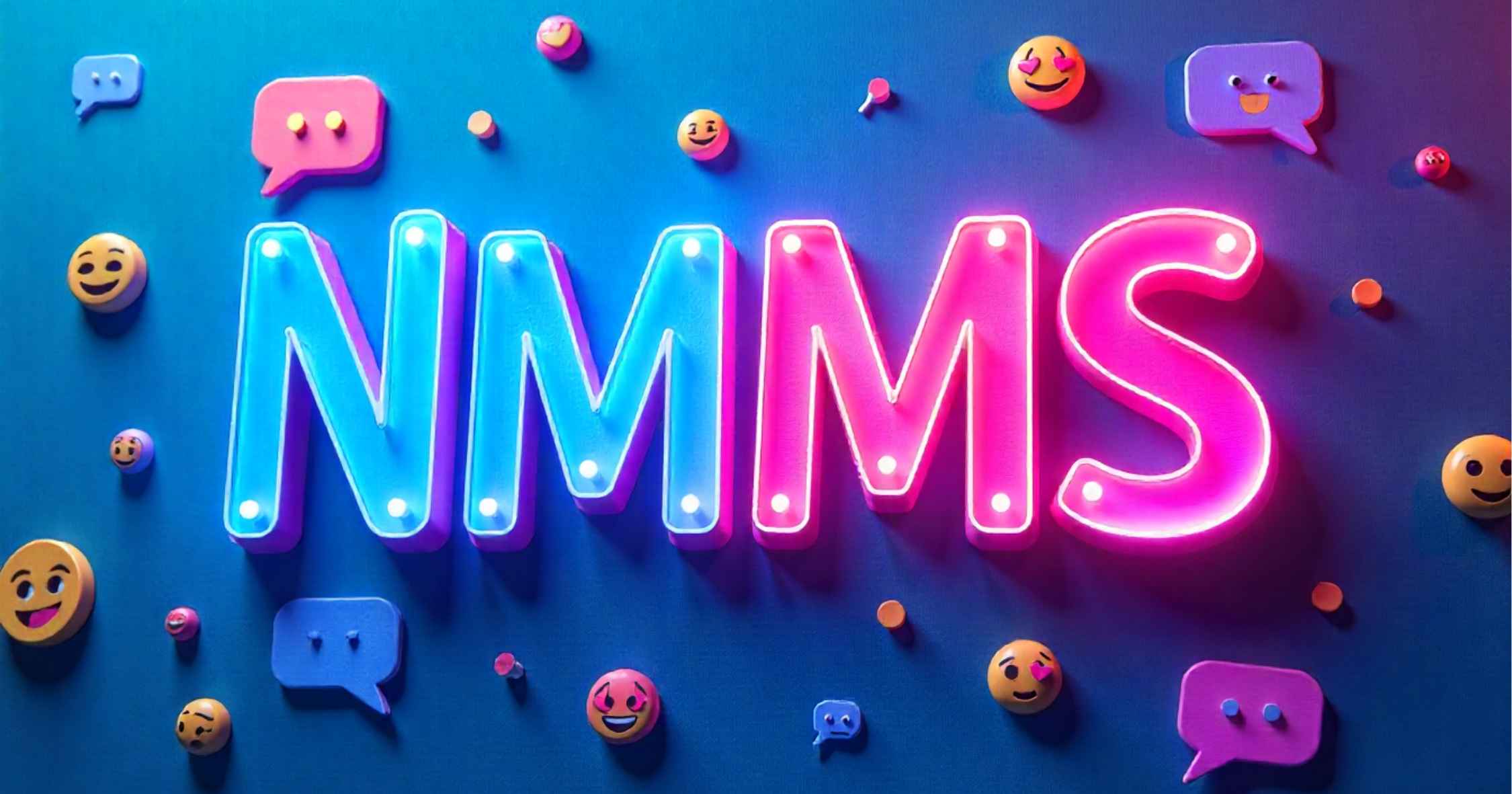Ever stared at your phone wondering what “NMMS” means? You’re definitely not alone. This Mexican Spanish slang has taken over social media platforms and casual conversations across America. Understanding this expression prevents those awkward “what did you just say?” moments.
NMMS appears everywhere nowadays. From Instagram comments to TikTok reactions, this abbreviation bridges cultures and generations. But here’s the thing—context matters enormously.
Let’s dive deep into this fascinating piece of digital culture. You’ll master NMMS usage in minutes.
What Does NMMS Mean in Text?
NMMS stands for “No Mames” in Spanish. Don’t let translation apps fool you here. The literal meaning doesn’t capture the real essence.
This texting slang evolved far beyond its original form. Today’s usage focuses on expressing shock and disbelief. Think of it as Spanish’s version of “No way!” or “Seriously?!”
Key characteristics of NMMS:
- Casual tone dominates usage
- Emotional reactions drive most conversations
- Context determines appropriateness completely
- Regional variations exist across communities
Mexican Spanish communities use this expression naturally. But American texters often struggle with proper usage. Cultural understanding makes all the difference.
Understanding NMMS in Text Messages
“No Mames” translates roughly to “Don’t suck” literally. But this direct translation creates massive confusion. Mexican Spanish operates differently than textbook translations.
The original phrase carried much stronger connotations. Street slang from decades past held more offensive weight. Today’s casual usage softened considerably.
Evolution of NMMS meaning:
- 1980s-1990s: Highly offensive street language
- 2000s-2010s: Casual friend conversations emerged
- 2010s-Present: Mainstream social media acceptance
- Current usage: Mild surprise expression
Bilingual speakers navigate this evolution naturally. They understand emotional context better than literal definitions.
Emotional Context Behind NMMS
NMMS carries powerful emotional context that varies dramatically. The same three letters express completely different feelings.
Primary emotional uses:
| Emotion | Context | Example Response |
| Surprise | Unexpected news | “NMMS! That’s incredible!” |
| Disbelief | Unbelievable story | “NMMS, are you serious?” |
| Frustration | Annoying situation | “NMMS, not again…” |
| Excitement | Amazing achievement | “NMMS! You did it!” |
Casual conversations benefit from this emotional flexibility. Friends understand tone through context clues. Social media platforms amplify these emotional layers.
The beauty lies in versatility. One expression handles multiple emotional responses. Digital culture loves this efficiency.
How NMMS Is Used in Conversations
NMMS thrives in specific situations. Understanding these scenarios prevents misuse completely.
NMMS thrives in specific situations. Understanding these scenarios prevents misuse completely.
Gaming conversations use NMMS constantly:
- Incredible victories trigger celebration
- Frustrating defeats need expression
- Unbelievable glitches demand reaction
- Team achievements deserve recognition
Social media reactions dominate usage patterns:
- Instagram stories get NMMS responses
- TikTok comments flood with reactions
- Twitter threads spark disbelief
- Viral content generates mass responses
Family group chats show generational gaps. Younger members use NMMS freely. Older relatives might feel confused or offended.
Dating app conversations require careful consideration. Cultural background influences reception. Some matches appreciate authenticity. Others prefer formal communication.
Examples of NMMS in Texting
Real examples demonstrate proper usage better than definitions. Context shapes meaning completely.
Scenario 1: Unexpected Success
Friend A: “Just got promoted to manager!”
Friend B: “NMMS! That’s amazing news!”
Context: Celebrating career achievement
Scenario 2: Unbelievable Story
Person A: “Saw a celebrity at Starbucks”
Person B: “NMMS, which one?!”
Context: Questioning incredible claim
Scenario 3: Gaming Frustration
Gamer 1: “Died right before the finish line”
Gamer 2: “NMMS, that’s so unlucky”
Context: Sympathizing with bad luck
Scenario 4: Social Media Reaction
Post: “Won $1000 lottery ticket!”
Comment: “NMMS congrats! 🎉”
Context: Celebrating someone’s fortune
These examples show casual messaging at its finest. Natural flow beats forced usage every time.
Origin of NMMS
NMMS traces back decades in Mexican street culture. Originally much harsher than today’s version.
The phrase emerged from working-class neighborhoods. Cultural roots run deep in Mexican Spanish communities. Regional dialects influenced development patterns.
Historical timeline:
- 1970s: Underground slang emergence
- 1980s: Urban youth adoption
- 1990s: Mainstream Mexican media usage
- 2000s: Cross-border migration influence
- 2010s: Digital platform explosion
Mexican immigrants brought this expression north. Hispanic groups maintained cultural connections through language.
Family dynamics shaped acceptance levels. Some households embraced casual usage. Others maintained strict language boundaries.
The Influence of Social Media
Social media platforms revolutionized NMMS spread. Character limits demanded abbreviations. Full phrases became impractical.
Instagram stories popularized quick reactions. TikTok videos reached diverse audiences. Twitter threads sparked conversations. Digital culture embraced efficiency.
Platform-specific adoption patterns:
| Platform | Usage Style | Typical Context |
| Group chats | Family/friends | |
| Story reactions | Quick responses | |
| TikTok | Video comments | Viral reactions |
| Reply threads | Public discussions | |
| Snapchat | Direct messages | Personal conversations |
Social media enthusiasts drove mainstream adoption. Influencers normalized casual usage. Online community acceptance grew rapidly.
Cross-cultural pollination happened naturally. Non-Spanish speakers learned through context. Virtual culture bridged language barriers.
NMMS and Emoji Combinations

Emojis transform NMMS completely. Visual cues eliminate confusion. Tone becomes crystal clear.
Popular emoji combinations:
- 😱 NMMS = Genuine shock/surprise
- 😂 NMMS = Humorous disbelief
- 🤦♂️ NMMS = Frustrated reaction
- 💀 NMMS = Extreme/hilarious response
- 🔥 NMMS = Impressed/excited reaction
Digital communication benefits enormously from visual context. Misunderstandings decrease significantly. Emotional layers become obvious.
Generation Z prefers emoji combinations. Millennial users adopt gradually. Social media culture drives these trends.
How NMMS is Used With Emojis in Texting
Strategic emoji placement enhances communication effectiveness. Position matters tremendously.
Before NMMS: Emotion sets expectation
- “😱 NMMS that’s incredible!”
- “🤦♂️ NMMS not again…”
After NMMS: Emotion reinforces meaning
- “NMMS that’s wild! 🔥”
- “NMMS seriously?! 😂”
Examples of NMMS with Emojis
Professional gaming reaction:
“Just clutched a 1v5 round!”
“NMMS 🔥 That’s insane skill!”
Relationship update surprise:
“Got engaged last weekend!”
“NMMS 😱💍 Congratulations!”
Academic achievement celebration:
“Graduated with honors!”
“NMMS 🎓✨ So proud!”
Travel adventure story:
“Missed flight, stuck in Paris!”
“NMMS 🤦♂️✈️ What happened?”
These examples demonstrate casual messaging enhancement through visual elements. Emotional context becomes unmistakable.
Variations and Related Slang
English equivalents capture similar emotions but lack cultural depth.
Common alternatives:
| Expression | Intensity | Formality | Best Context |
| “No way!” | Medium | Casual | Friends/family |
| “Seriously?!” | High | Casual | Questioning |
| “OMG” | Medium | Very casual | Social media |
| “WTF” | High | Very casual | Close friends |
| “Really?” | Low | Neutral | Any situation |
Spanish variations within Mexican Spanish communities:
- “En Serio?” (Are you serious?)
- “No Puede Ser” (It can’t be)
- “Qué Loco” (How crazy)
- “No Manches” (Cleaner version)
Texting slang offers countless alternatives. But NMMS maintains unique cultural significance.
Regional Differences in Slang Usage
Geographic patterns influence NMMS acceptance dramatically.
High-usage regions:
- California (largest Mexican-American population)
- Texas (border state influence)
- Arizona (cultural mixing zones)
- Nevada (growing Hispanic communities)
- Colorado (urban diversity)
Lower-usage regions:
- Northeast states (different cultural backgrounds)
- Rural areas (slower adoption rates)
- Traditional communities (conservative language preferences)
Latino communities show highest adoption regardless of location. Spanish-speaking regions maintain natural usage patterns.
Urban versus rural dynamics:
- Cities embrace digital culture faster
- Rural areas prefer traditional expressions
- College towns show mixed patterns
- Tourist destinations see increased exposure
When to Avoid Using NMMS
Professional boundaries exist for good reasons. NMMS belongs in casual conversations exclusively.
Inappropriate contexts:
- Business emails (completely unprofessional)
- Job interviews (instant disqualification)
- Academic papers (grade reduction risk)
- Legal documents (never acceptable)
- Medical communications (confusing/inappropriate)
Workplace dynamics vary significantly. Startup environments might accept casual language. Corporate settings maintain strict standards.
Age considerations matter tremendously. Older colleagues might find offensive. Cultural sensitivity prevents workplace conflicts.
Polite Alternatives to NMMS

Respectful substitutions maintain emotional impact without cultural confusion.
Professional alternatives:
| Situation | Instead of NMMS | Professional Option |
| Surprise | “NMMS really?” | “That’s surprising” |
| Disbelief | “NMMS no way” | “I find that hard to believe” |
| Excitement | “NMMS awesome!” | “That’s excellent news” |
| Confusion | “NMMS what?” | “Could you clarify?” |
Family-friendly options:
- “Oh my goodness!” (universal acceptance)
- “Wow!” (simple excitement)
- “Really?!” (questioning appropriately)
- “Amazing!” (positive surprise)
Social context guides selection. Casual messaging with friends allows NMMS. Formal communication demands alternatives.
Things You Should Know About NMMS
Critical knowledge points prevent embarrassing mistakes.
Age appropriateness guidelines:
- Teens/Young adults: Generally acceptable among peers
- Middle-aged users: Context-dependent usage
- Older adults: Often confusing or offensive
- Mixed age groups: Exercise caution
Cultural sensitivity factors:
- Mexican heritage users understand naturally
- Non-Spanish speakers might misinterpret
- Conservative families prefer cleaner alternatives
- Religious communities often discourage usage
Platform-specific considerations:
- Personal social media: Usually acceptable
- Professional networks: Avoid completely
- Family group chats: Know your audience
- Public comments: Consider broader readership
Important Points to Remember
Essential usage guidelines ensure appropriate communication.
Golden rules for NMMS:
- Know your audience intimately
- Context determines appropriateness always
- Emojis clarify intended meaning
- Professional settings require alternatives
- Cultural background influences reception
Red flags to avoid:
- Using with unfamiliar contacts
- Professional communication contexts
- Formal document inclusion
- Conservative family members
- Public speaking situations
Best practices:
- Casual conversations work perfectly
- Close friends understand easily
- Social media reactions feel natural
- Gaming communities embrace freely
- Cultural groups appreciate authenticity
Emotional intelligence guides proper usage. Digital natives navigate naturally. Language learners need extra awareness.
FAQs
What does NMMS mean in texting?
NMMS means “No Mames” expressing surprise, disbelief, or shock.
What does NMMS mean in Spanish slang?
NMMS stands for “No Mames,” meaning disbelief or amazement.
Is it NMS or NMMS?
NMMS is correct; NMS is incomplete abbreviation missing letters.
What does Naah mean in text?
Naah means “no” with casual, dismissive, or uninterested tone.
Conclusion
NMMS meaning in text reflects modern communication’s evolution beautifully. This Mexican Spanish slang bridges cultures across social media platforms and casual conversations.
Understanding emotional context prevents misunderstandings completely. Cultural roots provide depth beyond simple translations. Digital culture continues shaping language naturally.

